Table of Contents
ToggleCIVIL WEDDING IN CUBA
This article focuses on what you need to know to plan a civil wedding in Cuba. We’re referring to weddings understood as events, where the legal part may or may not be included within the ceremony experienced by the guests.
There are other legal ways to get married, such as by proxy or at a Cuban consulate abroad. However, this article doesn’t cover those alternatives because they’re not part of our work—it focuses on how to integrate the civil component into the wedding celebration and festivities.
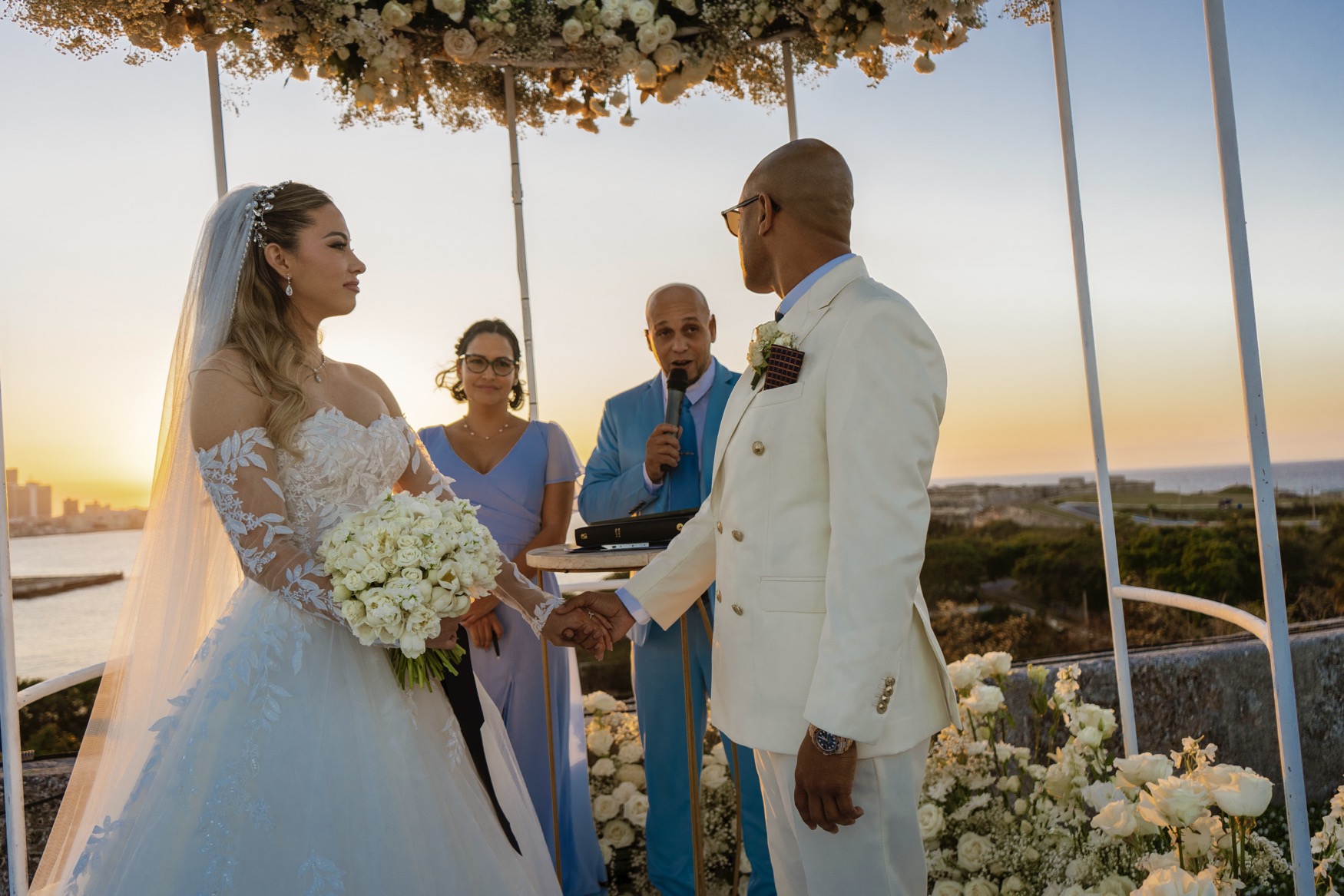
Documents required to celebrate a civil wedding in Cuba
Requirements vary depending on the nationality and marital status of the couple, but in general, the following are requested:
- Identity document.
- Certification of current marital status, if applicable (divorce or widowhood).
If both parties are Cuban, there is no need to present a certificate of singleness or birth. If one is widowed, a Widowhood Certificate must be submitted; and if divorced, a Divorce Certificate issued by the Civil Registry is required (a court ruling or an old marriage certificate with a marginal note is not sufficient).
When one or both parties are foreign nationals, the following documents must be presented:
- Passport
- Birth and single status certificate or equivalent civil status document.
- Legal capacity to marry (specific document issued in the country of origin).
- Official Spanish translation of all documents, and legalization or apostille as applicable.
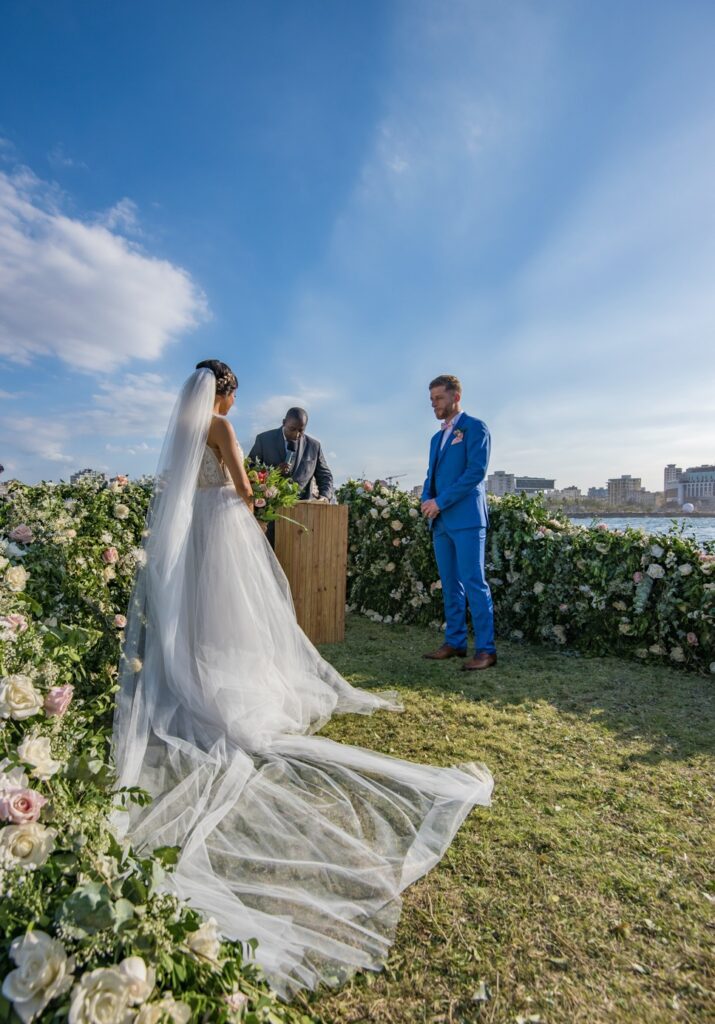
Civil wedding with foreigners
The civil marriage is the legal way to formalize the union between two people in Cuba, regardless of gender or nationality. However, not all notary offices can carry out the procedure when one or both parties are foreigners.
The civil wedding in Cuba involving foreign participation must be conducted exclusively through an International Legal Consultancy (CJI), the only entity authorized to validate this type of union. This applies both to mixed couples (Cuban and foreign) and to those in which both parties are foreigners.
Our recommendation is to consult the Cuban consulate in your country in advance to confirm the specific requirements for legalization or translation. Also, keep in mind that after formalizing the marriage in Cuba, you must legalize the marriage certificate at the Ministry of Justice (MINJUS) and then at the consulate in Cuba of your spouse’s country for it to have legal validity abroad.
Process for having a civil wedding in Cuba
The civil marriage process in Cuba is not completed immediately. First, all the required documentation must be submitted. Once everything is in order, a formal request for the service is made to the notary.
This request can be submitted by one or both parties, but it is essential that they attend the notary office in person to pay for the service and sign the official registry where the process is recorded.
That same day, a form is filled out with the personal details of the future spouses and the witnesses. Then, on the day of the formal act—whether at the notary’s office or at the ceremony location—the marriage deed is signed. Both the couple and the witnesses must sign at that moment, and the notary reads the Code before formalizing the marriage.
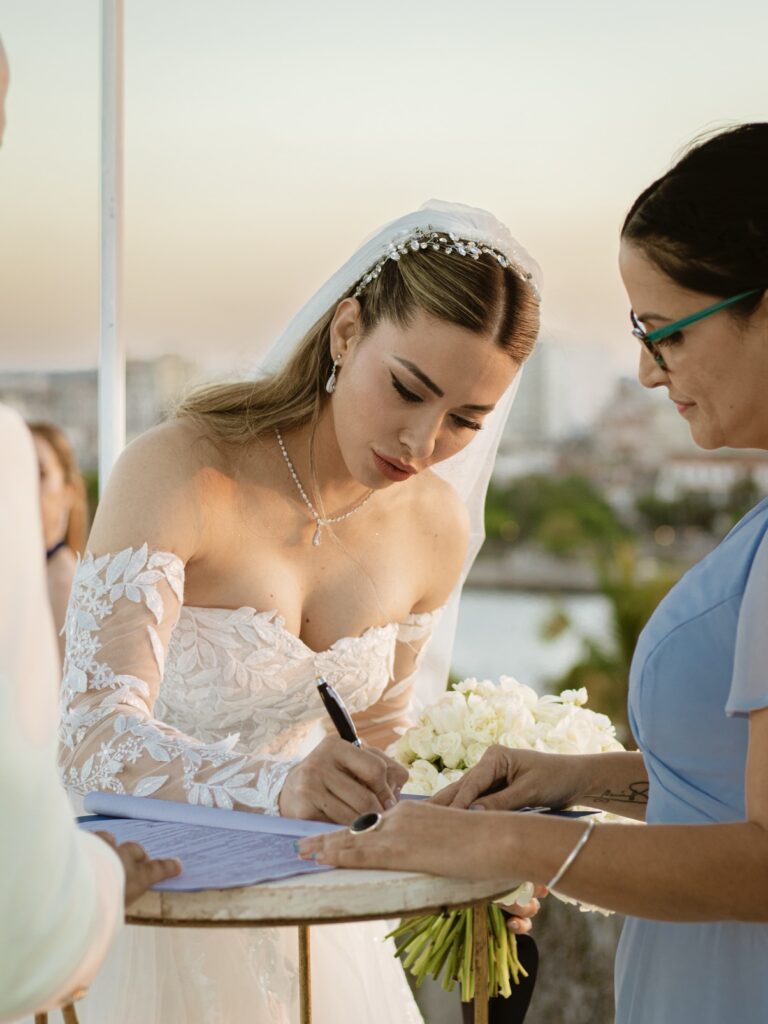
What do we recommend for the legal part of your wedding?
At Aire de Fiesta, we don’t usually handle the legal procedures. Experience has taught us that, for most couples, the most practical solution is to separate the official signing from the event. Unless it’s important to you that the wedding have legal effect at that exact moment, our recommendation is to handle that part separately.
Notarial offices in Cuba are the entities authorized to legally perform civil marriages. However, they are usually formal spaces not designed for celebrations. For this reason, they do not align with the style of weddings we organize. That’s why we do not offer wedding services inside notarial offices, nor do we recommend it if you’re looking for a well-curated experience with aesthetics and emotional value.
That’s why most of the couples we work with—whether Cuban, mixed, or foreign—choose to handle the legal part separately, quickly and privately, and then focus on a symbolic ceremony designed with intention: with words, aesthetics, emotions, and everything that makes a wedding a unique event. That’s the kind of experience we know how to create.
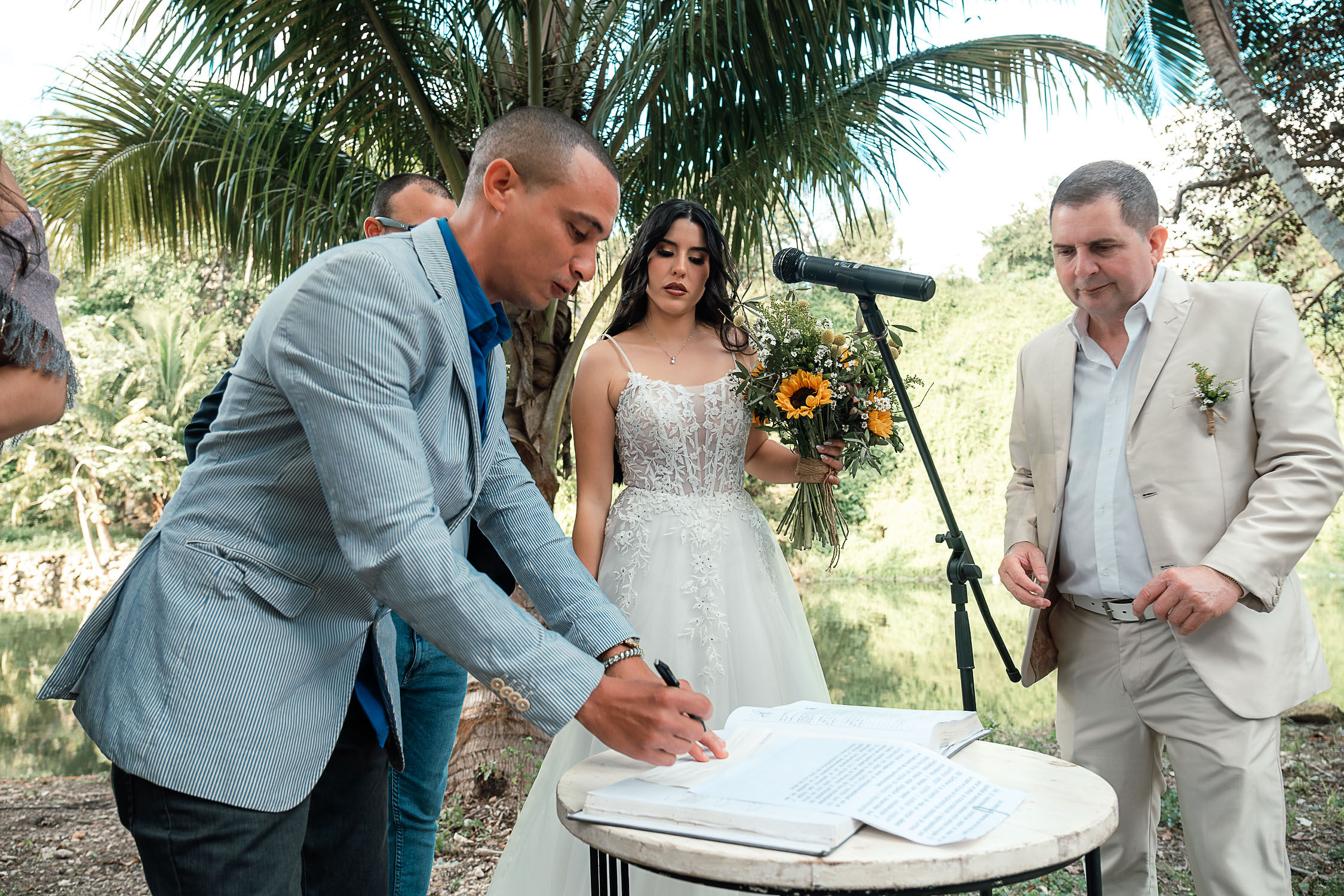
And what if it’s important to you that the legal act is part of the ceremony?
It’s possible to combine the legal moment and the symbolic ceremony into a single event, but it requires special preparation.
The reading of the Civil Code and the official signing are mandatory in any legal marriage in Cuba, but they are not designed to be part of an emotional ceremony. If inserted carelessly, they can break the rhythm and diminish the impact of the moment. That’s why, when a couple insists on having the legal act take place in front of their guests, our job is to design a structure that supports it.
We coordinate the notary’s transfer to the location and prepare a setup where the symbolic and the legal come together seamlessly. A master of ceremonies—or any figure chosen by the couple—can guide the moment, give way to the notary at the right time, and weave in vows, readings, or rituals with the legal formalization. This way, the ceremony doesn’t lose emotion or rhythm, and everything flows as a single story.
We’ve done it many times. Some of the most emotional weddings we’ve organized included the legal act within the ceremony itself, even combined with a pastor or spiritual guide. The key is to do it right. This option involves an additional cost for the notary’s travel and special arrangements, but it allows couples to experience the legal part without giving up the aesthetic setting or the style of celebration that defines Aire de Fiesta.
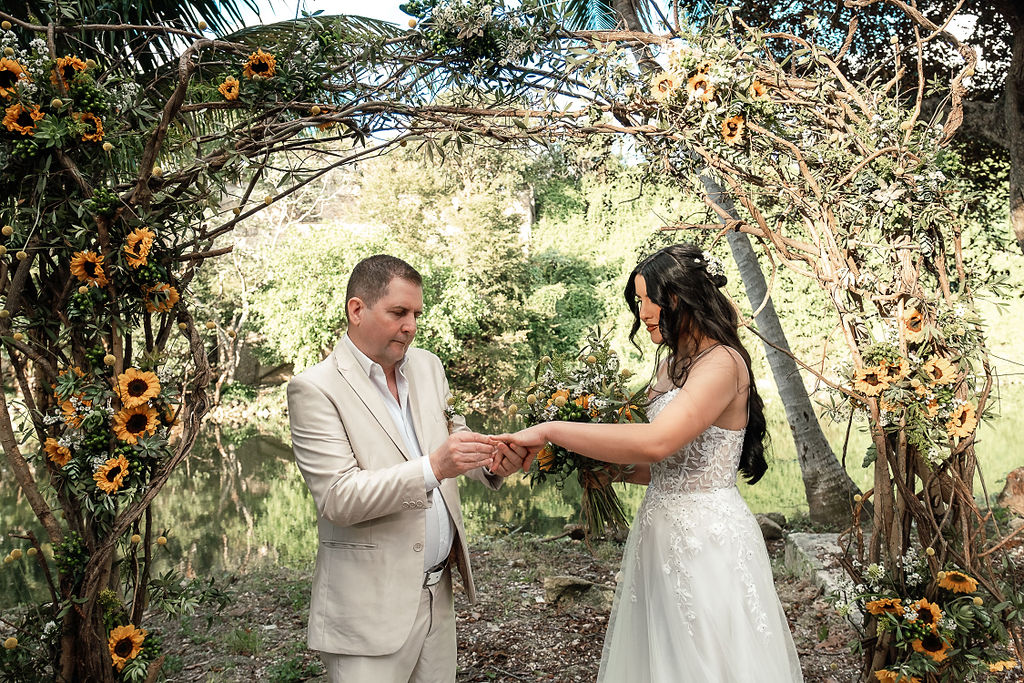
Frequently asked questions
Can I legally get married in Cuba if I’m not Cuban?
Yes. Foreign or mixed couples (Cuban and foreign) can legally get married in Cuba through an International Legal Consultancy, which is the entity authorized to validate this type of marriage.
What documents do I need if one or both parties are foreigners?
A passport, birth certificate, declaration of single status or equivalent civil status, and a certificate of legal capacity to marry are required. All documents must be translated into Spanish and legalized or apostilled according to the country of origin.
How long does it take to handle the legal part of the marriage?
The process is not immediate, but it usually doesn’t take too long if all the documentation is in order. The most important thing is to gather the required papers correctly and submit them properly. At Aire de Fiesta, we have a legal advisor who can help you review everything before submission to avoid mistakes or unnecessary delays.
Is it mandatory for the legal act to take place during the decorated ceremony with guests?
No. Many couples sign at the notary beforehand and later hold a symbolic ceremony with guests, decoration, and a personalized structure. This option allows them to enjoy the event without legal complications at that moment.
And what if I want to combine the legal act with the decorated ceremony?
We can organize a combined ceremony by bringing the notary to the event location and integrating them into the ceremonial script. This option requires more preparation and involves an additional cost, but it allows you to legally formalize the marriage without giving up an aesthetic and well-planned celebration.
Do you know the services we offer?
Full planning and coordination: We support each couple throughout the entire process — from early planning to full coordination on the day of the event. We work with a trusted network of vendors, allowing us to manage every part of the wedding with confidence, efficiency, and quality.
Learn more details about the wedding planning service.
Wedding decoration: This is our signature and our greatest strength. Events — especially the most exclusive weddings in Cuba — carry our stamp. We design spaces with attention to every detail and have our own furniture collection that reinforces our style and production quality.
Some couples sign at the notary and then celebrate; others prefer everything to happen in a single ceremony. Whatever you choose, a civil wedding in Cuba can also be planned with care and style. Contact us and we’ll help you plan it just as you imagine it.
SHARE THIS MOMENT
